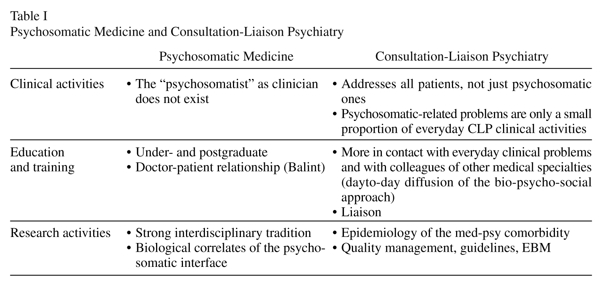Mi SciELO
Servicios Personalizados
Revista
Articulo
Indicadores
-
 Citado por SciELO
Citado por SciELO -
 Accesos
Accesos
Links relacionados
-
 Citado por Google
Citado por Google -
 Similares en
SciELO
Similares en
SciELO -
 Similares en Google
Similares en Google
Compartir
The European Journal of Psychiatry
versión impresa ISSN 0213-6163
Eur. J. Psychiat. vol.22 no.1 Zaragoza ene./mar. 2008
LETTER TO THE EDITOR
Comment on: Lobo A, Lozano M, Diefenbacher A. Psychosomatic Psychiatry: a European view. Eur J Psychiat 2007; 21: 153-168
Psychosomatic Psychiatry: a comment from Italy
Sometimes it takes the whole nine-month duration of a pregnancy, or even longer, to decide the name we will give to our child. Names are destiny, nomen omen the Latins said. Rational and irrational qualities of a name, its meaning, musicality, appeal, will mark the life of the person or thing that name identifies.
Because identity has to do with the name: this is why Lozano and Lobo felt there was the need to contribute to the discussion over the "name issue" as they did with their accurate and clever recapitulation of recent developments and happenings in the field of (the still so-called) consultation-liaison psychiatry.
The historical background and the situation in Italy are not different to that described in Spain: since the late '80s, the number of general hospital specific structured consultationliaison psychiatry services has progressively increased, and similar dedicated services have been established in primary care. Services of clinical psychology also exist in many hospitals or district areas. In recent times the Italian Society of consultation-liaison psychiatry (SIPC) has become one of the most active among national psychiatric associations1,2. Though the diffusion and strength of consultation-liaison psychiatry is very heterogeneous and sometimes depending on the interest and enthusiasm of individual colleagues, we are continuously collecting evidence of a growing popularity, based on scientific credibility and clinical relevance, both among psychiatrists and other physicians.
Consultation-liaison psychiatry and psychosomatic medicine share a common ground of cultural and methodological bases, but consultation-liaison psychiatry has progressively developed specific clinical, training and research competencies which go beyond those from the original psychosomatic tradition (i.e. management of delirium, self-harm risk behaviours, substance-abuse related disorders, medical-psychiatry comorbidity, multipledrug therapies... - Table 1).
The new denomination of "psychosomatic psychiatry" that Lozano and Lobo present and discuss in their editorial has many qualities: it preserves the proud dignity of the term "psychiatry" against the cultural defeat that the choice of the name of psychosomatic medicine has somehow represented; it defines the clinical focus of the discipline, and not just its actions; it promotes the integration, and not the implicit separation, of psychosomatic medicine and consultation-liaison psychiatry.
Nevertheless, a few limitations of this new name should also be stated: first of all, we are worried it could be the first step of a "perverted" chain-reaction that could lead, in time, to the institution of a psychosomatic dermatology, psychosomatic cardiology, psychosomatic-XXX, going on virtually forever; this would end up in spoiling and devaluing both terms.
Second of all, the two terms should better not be in such a hierarchical relationship (psychiatry as the noun and psychosomatic as the adjective, or the other way round), but more preferably on the same level of importance, as it can be for example in the name of an association or a subspecialty (consultation-liaison psychiatry AND psychosomatic medicine). Of course something has to come first, and no too long name could be effective and appealing, but maybe we can think of more favorable grammatical solutions.
Finally and most of all, we feel we are not yet ready to abolish forever the terms and concepts of consultation-liaison, for what they still mean and represent after so long.
Unfortunately we have not a counter-proposal to suggest. But all of us, also speaking in the name of the European Association for Consultation-Liaison Psychiatry and Psychosomatics (EACLPP, www.eaclpp.org), are ready to go on discussing the name, and destiny, of our big child.
Marco Rigatelli, Silvia Ferrari
Department of Psychiatry, University of Modena and Reggio Emilia, Modena. ITALY
References
1. Ferrari S, Rigatelli M: General hospital psychiatry in Italy: an update. J Psychosom Res, 2006; 60: 217-218. [ Links ]
2. Rigatelli M, Ferrari S: The Modena (Italy) Consultation-Liaison Psychiatry Service. Br J Psychiatry, 184: 268-269, 2004. [ Links ]















